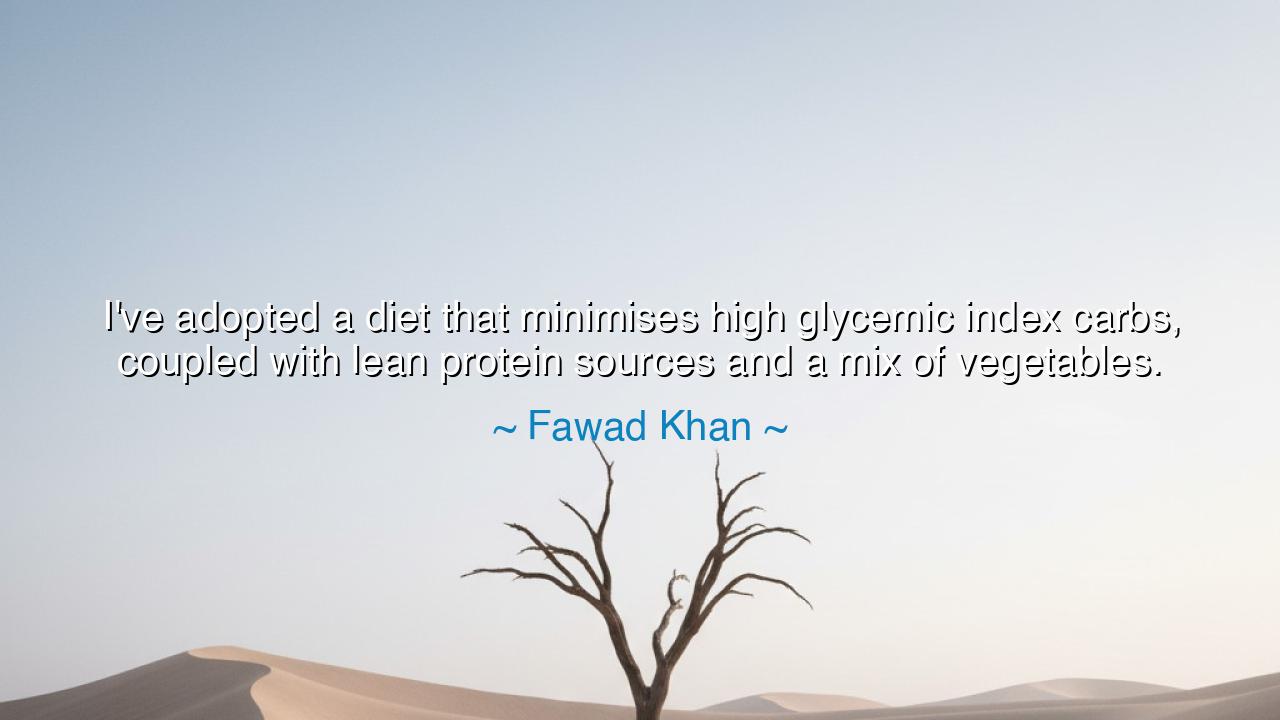
I've adopted a diet that minimises high glycemic index carbs
I've adopted a diet that minimises high glycemic index carbs, coupled with lean protein sources and a mix of vegetables.






When Fawad Khan declared, “I’ve adopted a diet that minimises high glycemic index carbs, coupled with lean protein sources and a mix of vegetables,” he was not simply describing a meal plan — he was revealing a philosophy of self-mastery, balance, and awareness. His words carry the quiet authority of one who has learned, through experience and discipline, that the body is not a vessel to be indulged, but a sacred instrument to be tuned. To control one’s diet, as Fawad speaks of doing, is not merely to manage food — it is to manage life itself. For food is the meeting place of nature and will, where pleasure and wisdom contend, and where the wise learn that true power lies in moderation.
The origin of this wisdom arises not from fashion or vanity, but from necessity. Fawad Khan, who has long spoken of living with diabetes, understands what many ignore — that the body is both resilient and fragile, both servant and master. The mention of “high glycemic index carbs” reflects not only scientific awareness but also ancient intuition: the understanding that food that burns too quickly in the body burns too quickly through life. By choosing lean proteins and vegetables, he aligns himself with the timeless rhythm of nature — foods that sustain, not shock; that nourish, not numb. His diet is not a punishment, but a discipline of equilibrium, where every choice becomes an act of respect for the self.
The ancients, too, knew this truth. The physician Hippocrates, father of modern medicine, taught that the secret to health lay in aligning one’s habits with the natural order. “Let food be thy medicine,” he said, “and medicine be thy food.” The Stoics of Greece and Rome believed the same — that to live well, one must not be ruled by desire, but by discernment. They would have understood Fawad’s approach perfectly. To minimise excess, to choose clean over heavy, to pair energy with stability — these are not modern inventions, but the eternal language of balance. In this way, Fawad’s quote stands as a bridge between modern science and ancient wisdom: a reminder that the pursuit of health is, and has always been, a spiritual act.
Consider the story of Pythagoras, the philosopher who founded his school not only on mathematics but on the purity of body and mind. He instructed his students to eat sparingly, to avoid foods that clouded thought or inflamed the passions. His purpose was not asceticism, but clarity — for he knew that the mind cannot rise when the body is burdened. In his students’ restraint, he saw strength; in their simplicity, he saw enlightenment. So too does Fawad Khan embody this principle. His diet is not an act of denial, but an act of freedom — freedom from the cycles of craving and consequence that enslave so many.
There is great emotional strength in the phrase, “I’ve adopted a diet.” Adoption implies conscious choice, a taking-in of responsibility. In a world that tempts us with convenience, to eat with awareness is to rebel against the current of carelessness. By choosing foods of low glycemic load, Fawad practices patience; by favoring lean proteins, he builds endurance; and by embracing vegetables, he chooses renewal. Each meal becomes a quiet meditation on balance — a reminder that mastery over one’s appetite is mastery over one’s destiny.
His words also speak to the modern struggle between health and indulgence, between discipline and desire. Many live as though pleasure were the only goal of eating, yet they wonder why vitality fades. Fawad’s philosophy offers a gentler path — not the rejection of pleasure, but its refinement. By shaping his diet around balance, he has found a way to live with joy that does not destroy, with satisfaction that does not sicken. The lesson is not abstinence, but awareness. To live well, one must eat as the wise have always done — with gratitude, restraint, and intention.
Thus, my children of the modern age, take heed of this wisdom. You need not starve to be strong, nor feast to be fulfilled. Eat foods that serve your body’s design, not your fleeting cravings. Choose nourishment over indulgence, clarity over confusion, discipline over impulse. Let your plate reflect your purpose. For in every bite you take, you shape the vessel that carries your soul through this life. As Fawad Khan reminds us, the diet of balance is not a restriction — it is liberation, the art of living in harmony with the self.
And remember this final truth: the path to health, like the path to wisdom, is never sudden. It is built through small choices, made daily, with patience and reverence. When you eat with mindfulness, you do more than feed your body — you feed your spirit. And in that harmony of flesh and soul lies the highest form of freedom: the freedom to live strong, aware, and whole.






AAdministratorAdministrator
Welcome, honored guests. Please leave a comment, we will respond soon